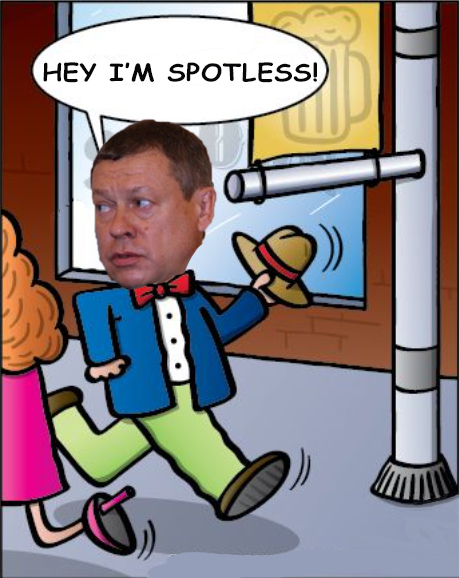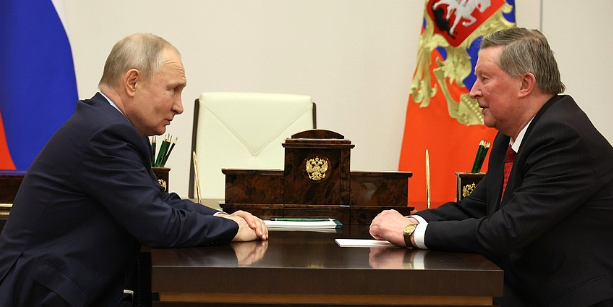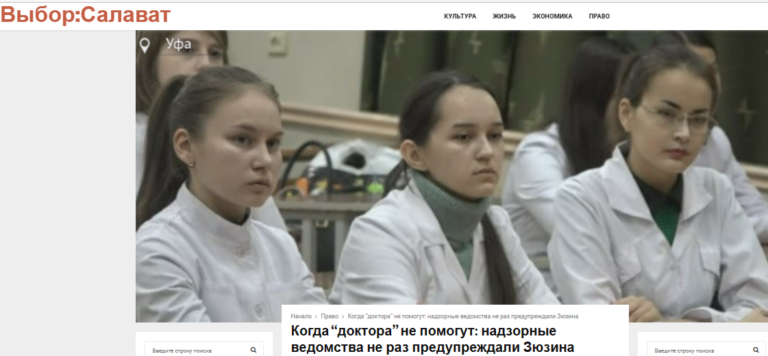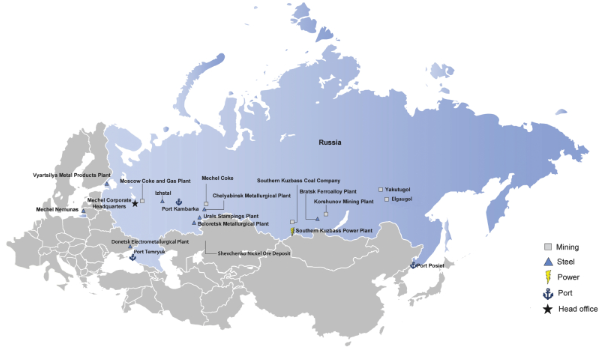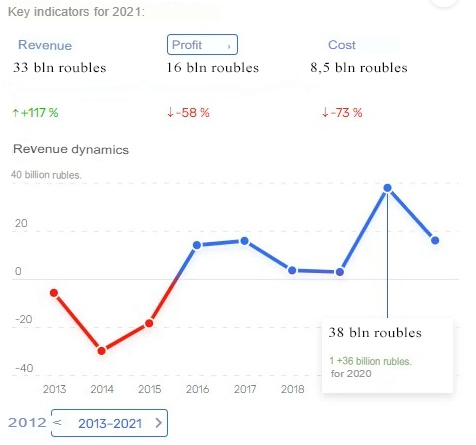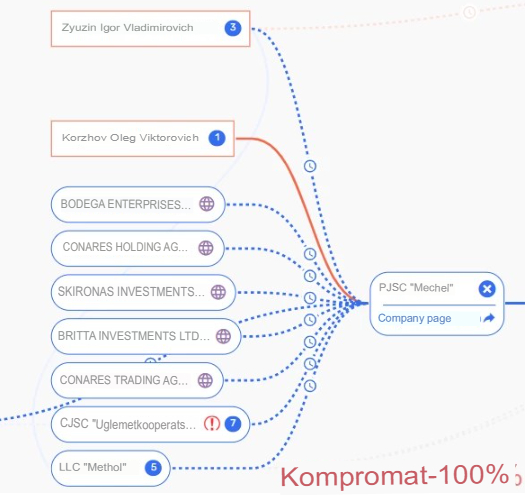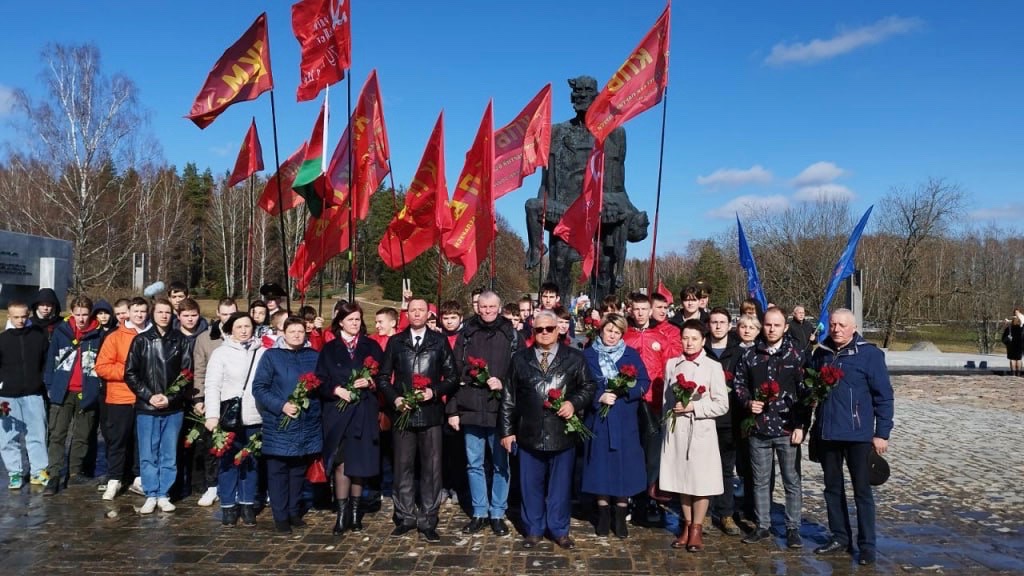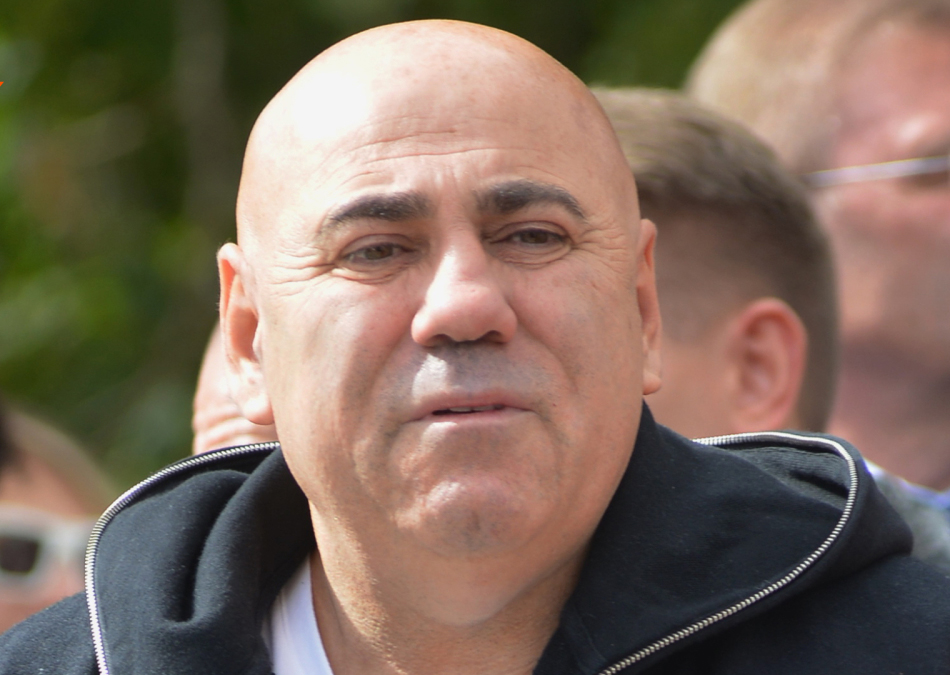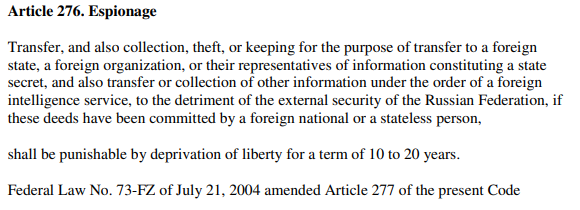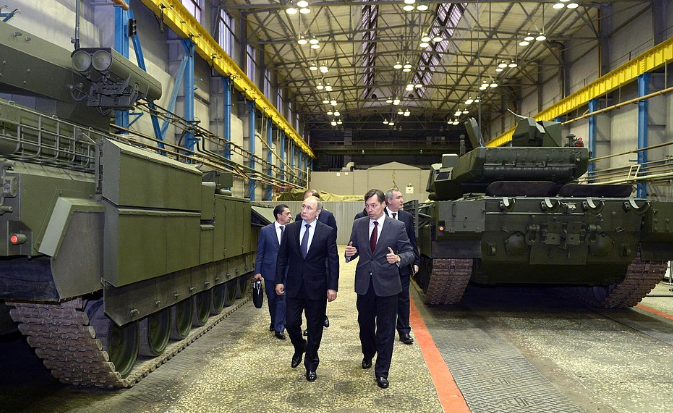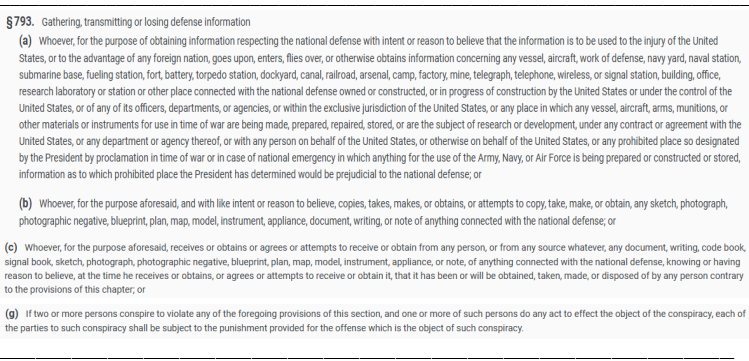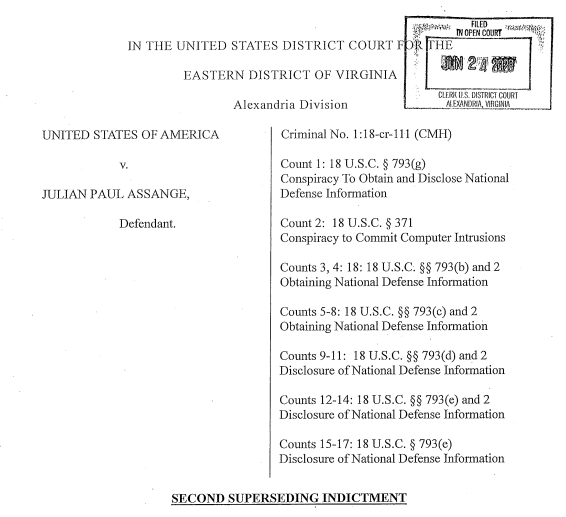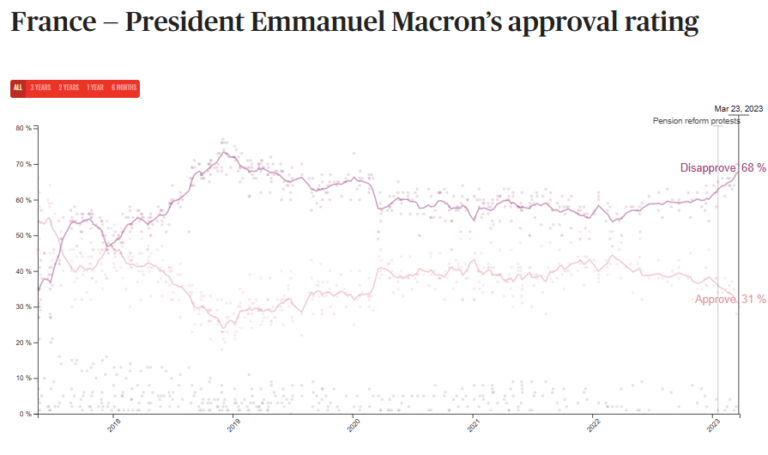Journalist Pavel Zarubin’s interview with Vladimir Putin, 25 March 2023
I normally pay very little attention to Russian television journalist Pavel Zarubin, who is best known as the co-host of a Sunday evening program called Moscow, Kremlin, Putin, which is broadcast in between two of the best known weekend shows on Rossiya 1, News of the Week with chief of all news programming Dmitry Kiselyov and Evening with Vladimir Solovyov, a political talk show that in the past I have often cited as an indicator of views held by Kremlin elites.
In general, my attention span for the two lead programs has suffered greatly in recent weeks. Kiselyov has extended his program to over two hours. It is simply too long and unfocused. Moreover, the war coverage, particularly the coverage of the material damage and injuries caused by Ukrainian artillery and rocket strikes on Donetsk city and nearby settlements, is painful to watch and very repetitive week after week. No one in the West cares at all about these Ukrainian inflicted atrocities, while for the Russian audience this raises embarrassing questions as to why, after more than a year of war, the Russian Army has been unable to destroy the Ukrainian positions within firing range of the capital of the Donetsk Republic.
As for Solovyov, he has become insufferable because of the way he bullies some of the very respectable experts who are his panelists. I think in particular of his hectoring one dean of international affairs at Moscow State University, an expert on the USA, whom he interrupts and loudly contradicts, not letting him finish a sentence. Meanwhile, Solovyov is very deferential to others of his guests, most notably RT editor-in-chief Margarita Simonyan and Mosfilm general manager Karen Shakhnazarov. Solovyov is perpetuating the worst traditions of Russian talk shows, which were always a blood sport, though in the past it was foreign guests, from Ukraine or Poland or the USA, who took the fist on their chins. Solovyov should be taken off the air and his place should be ceded to the hosts of Sixty Minutes, who are more informative and more civilized. Many of the panelists on both shows are the same; indeed being a television panelist is probably a major source of income for these experts and would explain why they agree to suffer indignities on air.
As for Zarubin, I have systematically skipped his programs because he regularly plays the clown, telling the audience with a smirk that he will take us all behind the closed doors of the Kremlin to see how the President does his job. It is patently obvious that the substantive content of what goes on in the Kremlin is kept under seven seals and that Zarubin will present only useless tidbits, such as how Putin knots his tie or enjoys his breakfast. These crumbs from the table can only serve a personality cult, which I thought Putin had better judgment to discourage.
Be that as it may, today Rossiya 1 has broadcast a self-standing twenty-six minute interview that Zarubin conducted with Putin yesterday. Lo and behold, we see that this journalist can perform as a real professional when it suits him and his paymaster. His questions to Putin are important and obviously were reviewed with Vladimir Vladimirovich before they went before cameras because the answers have been meticulously prepared.
https://smotrim.ru/video/2586445
There is much here that our political and military leaders in the West would do well to study.
In what follows, I will first provide an abbreviated transcript of the interview in which I summarize the essence of the questions and answers. The translation is, of course, my own.
Second, I will point to one mainstream newspaper and a couple of television broadcasters who have presented to their audiences a commentary on an item of particular interest in this interview.
Finally, I will offer my own analysis of what is especially newsworthy in the interview.
*****
Question: The West keeps saying it is supplying weapons to Kiev in response to what they call Russian aggression and to prepare Ukraine for a counter-attack. What is your evaluation of the military supplies being sent to Ukraine by Europe and NATO: the tanks, the one million artillery shells; and what about their plans to send fighter jets? Does this pose a real threat to Russia?
A: Of course, these present a threat to Russia. But let’s look in detail. One million shells for Ukraine. Is that a lot or little? Of course, it is a lot. But, in the leading NATO country, in the USA, according to the data we have, they have monthly production of 14,000-15,000 artillery shells. Meanwhile the Armed Forces of Ukraine are using up to 5,000 shells every 24 hours. Next year, in the USA they plan to produce 42,000 per month; and in 2025, 75,000. Still, in this year it is 15,000. As for us, the military industry of Russia produces much more. I don’t want to comment on the intentions of the Western suppliers. But here in Russia the military industry is expanding at a very fast rate, much faster than the West expected. So in the period during which the West supplies to Ukraine 1 million shells, we will produce more than three times as many. The Western supplies are an attempt to draw out the conflict. They are planning to send to Kiev 460 tanks, but here too the same story as with artillery shells. Russia will in this time produce 1,600 new and modernized tanks. The total number of tanks which Russia has will be more than 3 times what the Ukrainian army will have. I don’t talk about planes, because there the difference is several orders of magnitude. The result of the new shipments of arms to Kiev will only be to prolong the fighting, which is what they want, but as for outcomes they just exacerbate the tragedy.
Q : Guns or butter?
A: In the USA and in some NATO countries this will be the choice they face, but here in Russia we have budgeted to cover all of our preexisting infrastructure development, civilian residential construction, healthcare, education – we are not cutting back on anything. We have organized our economy so that there is no excessive militarization.
Q: the Ministry of Defense has announced they will supply to Kiev artillery shells with depleted uranium. Then in your meeting with Xi you said that in response Russia is considering sending tactical nuclear weapons to Belarus. Then the British insisted there is no danger in the depleted uranium munitions, they leave no radioactive traces.
A: That is not the case at all. These artillery shells are, of course, not weapons of mass destruction. But they do create radioactive dust and in this connection they belong to the category of most dangerous weapons. Experts agree that after use of these weapons in Yugoslavia, in Iraq the incidence of cancer in the civilian population rose many times over. And if we look at the use of these in Ukraine, where the residents are supposedly considered to be their own, they will nonetheless be exposed to these agents, and that will have an impact on the soil in the areas where they are used. So these weapons are very dangerous not only for combatants but also for the environment and for ordinary people living in these territories. Russia has the means to respond to this. We have literally hundreds of thousands of such artillery shells. Up to now, we have not used them.
As regards my talks with Alexander Grigor’evich Lukashenko, the decision to send tactical nuclear weapons there was prompted by the announcement from Britain on depleted uranium artillery shells. But without any reference to this latest development, he has long requested that we provide to Belarus tactical nuclear weapons. There is nothing unusual about this. The USA has done precisely the same for decades, supplying such weapons to its allies, NATO members: Turkey, Germany, Belgium, Netherlands, Italy and Greece. And so we decided to do exactly the same, without violating in any way our obligations under the Non-ProliferationTreaty. We have helped the Belarus colleagues to reequip their jets to carry these tactical weapons. We have given over to Belarus our very effective missiles Iskander, which can also be a delivery vehicle. On 3 April we will start training the flight crews. And on 1 July we will complete the construction of a special storage base for these weapons.
Q: In your meeting with Chinese President Xi you announced that Russia will be trading in Yuan not only with China but with other countries. In the West, this was seen as an attack on the global status of the dollar. Are you doing that?
A: No. It is not true that we are attacking the dollar. We would use the dollar, but they do not let us have them. So we have to settle accounts in a currency that is acceptable to our business partners, and the Yuan is one such acceptable currency, all the more so as it is used by the IMF. They [the USA] themselves sawed away the branch on which they were sitting. By restricting the use of dollars on the basis of momentary considerations of a political nature, they have done harm to themselves. The fact that they froze our gold and currency reserves: the whole world was watching and thought about this, about just how reliable their American partner is. And they all came to the same conclusion: America is not reliable. And so we are pleased to agree with our commercial partners to trade in Yuan. The oil exporting countries in the Middle East also have said they want to settle accounts in Yuan. So we will gradually extend this, extend the use of all currencies that are reliable. Yes, we understand the present-day advantages of the dollar. There are limitations on all the currencies we use today, not only the Yuan. But all countries are interested in strengthening their national currency and all countries will move in this direction. So, without a doubt, this was a great mistake on the part of the American authorities.
Q: On the first day, we in the press pool were waiting outside the Kremlin for you and Xi to come out. It grew dark and only at 9 pm you emerged, after more than 4 hours together. What did you talk about for so long on that first day?
A: First we had a working supper. Then I invited Xi to come to my rooms in the Kremlin. Recently I have been spending time and spending nights in this Kremlin apartment. So we moved there and sitting next to the fireplace, we drank tea and talked about everything without being in a rush. We talked about the situation in world affairs, in their most varied aspects. The Chinese Chairman devoted a good deal of attention to the positive elements in the Chinese peace plan for Ukraine. By the way, it was at this time that we learned about the EU plans to send one million artillery shells to Ukraine. And the next day, as we were standing before the press we learned about the British plan to send depleted uranium shells to Kiev. It is as if this was done especially to interrupt our agreement. And so we see on one side the aggressive intentions of the West and on the other the peaceful resolution promoted by China. During these four hours we discussed Russian-Chinese relations in all aspects, above all in the economic sphere. China and Russia can complement one another. For China this is first of all with respect to hydrocarbons. China needs a reliable supplier and we can assure that. Since import from the dollar zone is closed to us, we don’t have any particular need for dollars.
We spoke a lot about economic cooperation and with the Chinese we will combine our efforts in technological areas, where each of us has well developed competitiveness in world markets.
The Chairman of the PRC is a very interesting talking partner. He is deeply immersed in international affairs, in the economy, in his own country and others including ours. He was well prepared. It is interesting to talk to him. I think we each got a lot of satisfaction out of this.
Q: Denmark has found an unidentified object near one of the gas pipelines and invited Gazprom to take part in investigation. Are we certain there will be a real investigation of the destruction of Nord Stream?
A: It will be difficult, very difficult to conduct a real investigation, though in the end what happened will be known. However, an American journalist who has become quite well known now in the world conducted an investigation and came to the conclusion that the explosion of the Nord Stream pipelines was organized by American intelligence agencies. I completely agree with such conclusions.
What has just happened with respect to Denmark: Gazprom found that 30 km from where the explosions took place, at a connection point of pipes, another vulnerable location, there is an unidentified object. This was photographed by our people who suppose it is an antenna for initiating an explosion. We informed the Danish authorities and asked to investigate this object together with other international experts in the supposition that maybe some more explosives are in the area which for some reason were not detonated. We were told that our participation was not necessary. Then we eventually got a diplomatic note from them that they studied the object, that it is not explosive. They could have added that “it is no longer explosive.” But at any rate there will not be further explosions.
They have invited the Nord Stream consortium to come and see, but not invited Russian specialists. However, there would not be any benefit for us now to be present. To be sure, our intention was not to find material to expose anyone but to ensure that there will be no further explosions.
Q: There have been massive demonstrations in France over the raising of the pension age. How do you view this considering that we also raised the pension age in Russia?
A: Firstly that is their internal affair in France. But of course we understand that many countries carry out reforms of this nature. It is hard to think of a country in our modern day world where this is not done given that life expectancy is rising everywhere and the number of pensioners is growing.
But there is a big difference between what we did in Russia and how they have proceeded in France. Firstly, we retained the five-year difference in the pension age of women and men. In France there is no such distinction. Second, we set a long time period for the transition – 10 years. This significantly relieves the burden on citizens. And finally, most importantly, we preserved all the privileges of taking retirement early. But in France, as far as I know, they did not do this. They liquidated all such privileges. Citizens of France saw this as excessively tough and unjust, because various forms of labor require different approaches to the question of going on pension.
*****
Out of all the material in the interview, one item was picked up by the world press: Putin’s announcement of the transfer of tactical nuclear weapons to Belarus. On Euronews and BBC, we heard from retired NATO generals that this would give the Russians no practical advantages and would not affect the West’s readiness to respond to nuclear threats. By contrast, The Financial Times published a lengthy article that contained a lot of material which an objective reader could use to understand why the transfer was decided precisely now, though in its presentation by FT muddled cause and effect, as is very common in the propaganda texts that pass for journalism these days. We read the following:
The Russian president’s comments [on the placement of nuclear weapons in Belarus] came only days after he signed a joint statement with Chinese leader Xi Jinping in which Moscow and Beijing declared: ‘All nuclear powers must not deploy nuclear weapons beyond their national territories and must remove all nuclear weapons they have deployed beyond their borders.’
The FT is presenting this decision as a violation of Putin’s high sounding principles. They intentionally overlook the logic that Putin is preparing the way for eventual pull-back of these weapons by all parties in some future negotiations with the U.S. That is to say, Putin has just bought his own poker chips.
We saw from the interview that Zarubin considered the decision on Belarus as Russia’s asymmetric response to the announcement by the UK Defense Ministry about sending depleted uranium artillery shells to Kiev. Putin seemed to concur on that explanation.
However, we need not take every word from Putin at face value. Stationing the weapons in Belarus puts them just at the border with Lithuania, with Poland, whereas the American nuclear weapons are stationed several hundred kilometers to the West. This puts Lithuania and Poland under immediate nuclear threat because of decisions taken by the USA together with Germany, Belgium and The Netherlands. This could open up fissures in the Alliance.
And quite separately, on the News of the Week program this evening one analyst explained that Russia’s response to the British use of special depleted uranium shells would be to use their own wolframite filled shells, which have armor-piercing functionality similar to depleted uranium but are not radioactive. If indeed, the British will be providing the depleted uranium shells only for use in the fourteen Challenger 2 tanks they are sending to Ukraine, then the decision on weapons to Belarus would seem to be disproportionate.
Otherwise, the interview is particularly interesting for Putin’s remarks on the use of Yuan for trade with third countries, which can promote a mighty shift against the dollar in the Collective South.
I have included Putin’s comments on the flaws of the pension reform in France that have contributed to the rage of so many French demonstrators and may yet bring down the Fifth Republic. It is curious to see this kind of substantive analysis coming from Moscow when we read not a word about it in our Belgian or UK newspapers.
©Gilbert Doctorow, 2023
*********
THE BRITISH GOVERNMENT’S NOVICHOK SEQUEL, THE STURGESS DEATH INQUIRY, ISSUES A NEW SECRECY VETO FOR POLICE, GOVERNMENT OFFICIALS & SPIES
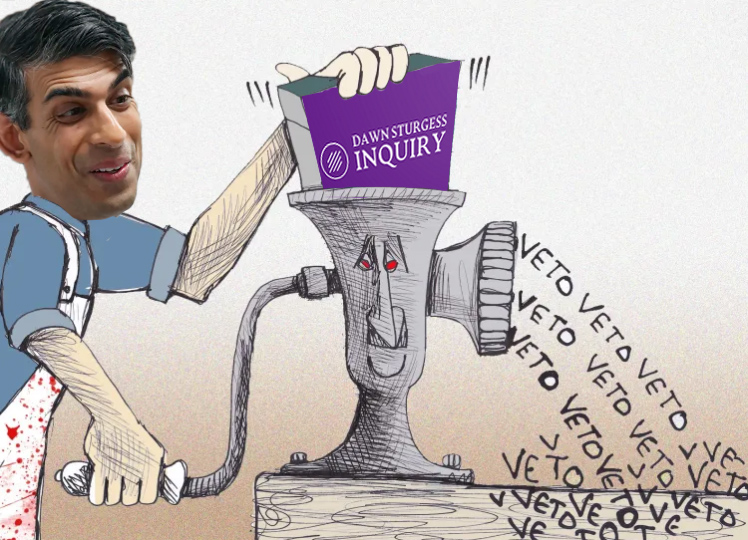
By John Helmer, Moscow @bears_with
The British Government (lead image, Prime Minister Rishi Sunak) has decided that in public hearings to confirm that Russian-made, Russian-delivered Novichok killed Dawn Sturgess in mid-2018 – after failing to kill Sergei and Yulia Skripal weeks earlier – nothing can be said or revealed without being subject to an immediate veto by the police, the MI6 spy agency, and other UK officials.
The veto will cover police records; closed-circuit television (CCTV) films; laboratory reports by the Defence Science and Technology Laboratory at Porton Down; Salisbury District Hospital patient admission and clinical test results; witness testimony; coroner’s cremation forms – in fact, everything which may expose, not what really happened to the Skripals and to Sturgess, but what didn’t happen to them which the British Government insists it did.
That evidence is what is called “sensitive information” in the state inquiry into the cause of Sturgess’s death which held a new courtroom session in London on Friday.
Lord Anthony Hughes, the retired judge appointed to run the proceeding, acknowledged this month that “there is a risk that sensitive information might be disclosed, inadvertently or otherwise, during the course of the open preliminary hearings.” Accordingly, he has announced, that “there will be two video links to afford those not present in the hearing room with access to the hearing – a ‘live link’ and a ‘delayed link’, which will be delayed by 5 minutes. The public and media attending the hearing remotely will do so by means of the delayed link.”
In the 5-minute delay, Hughes has decided, “in the event that sensitive information is disclosed in the course of an open hearing whilst these measures are in place or a Core Participant informs the Chair that he considers that sensitive information may have been disclosed, the Chair will consider taking the following steps (if necessary by receiving submissions in closed session): a. an immediate termination of the delayed link; b. making a restriction order to prohibit the publication of the sensitive information; c. ensuring that when the delayed link feed is resumed, the sensitive information (including any submissions concerning any information which a Core Participant considers may be sensitive information) is not broadcast.”
The inquiry has already decided that the “core participants” include the Sturgess family, several branches of the British police, the Home Office representing the intelligence agencies and Porton Down, the Wiltshire Council, and the regional ambulance service which responded to emergency calls for the Skripals on March 4, 2018, and for Sturgess on June 30.
Sergei and Yulia Skripal have been designated core participants, but their lawyer, Adam Chapman, has refused to confirm that the Skripals have appointed him to represent them or that they are still alive. Without explanation Chapman was absent from the latest court hearing last Friday.
Hughes opened the new hearing in London on March 24. A re-enactment of a secret, closed-door hearing a few days earlier, the session for public and press consumption lasted for three hours. Click to read the transcript.
The police told the judge they have compiled a total of 66,000 items of evidence; of that total, they say 48,438 items have been delivered by the police to the judge’s staff for their review. Duplicates of the same evidence may add up to 16,000 items; that’s one piece of evidence in three.
Going much more slowly, the government told the judge the “inquiry experts have identified 13 sensitivities in over 1,000 documents so far.”
Drafting statements for witnesses who may be called to testify to the inquiry, either in open session or in secret, is also under way in parallel. It is not yet known whether Sergei and Yulia Skripal will be permitted to testify in public.
“Once we know in its entirety what material is to be disclosed,” announced Cathryn McGahey QC, the lawyer for the Home Office, Defence Ministry, Porton Down and the intelligence services, “then our experts in their particular fields can look at all the material in each particular area and say, ‘It’s safe to do X’ or, ‘it’s not safe to do Y’.”
McGahey did not explain what “safe” means, and for whom.
“I mean, it’s absolutely true that as we go through this process we will try to pick up risky pieces of information that put together might cause a problem. In my submission, sir, the risk is a very real one and it happens in real life… HMG [His Majesty’s Government] does understand, sir, that we are asking you to allow us a lot of time to do something with a lot of care, but that is because of the importance of what we are doing. [HUGHES] All right — sorry, go on. MS MCGAHEY: Careful management of disclosure is absolutely key. [HUGHES] Central to the whole business of this exercise. S MCGAHEY: Yes, and it would be disastrous if an inquiry intended to learn lessons actually led to us making a mistake that made us less safe than we are now.”
Exactly what is meant by “sensitive” government officials had told the judge inwriting earlier this month. For them McGahey told Hughes on Friday, sensitivity means almost anything or everything connected to Russia. “The sensitivities around this inquiry,” said McGahey, “are greater than those in the vast majority of inquests and inquiries. Investigations into deaths caused by terrorist atrocities often involve a lot of sensitive material that has to be protected, but the terrorists who threaten the safety of the UK and who might exploit sensitive information if it’s disclosed by mistake have absolutely nothing like the sophistication of a hostile state that is Russia.”
The government spokesman was implying that Russia was to blame for Novichok and that Novichkok had caused Sturgess’s death – the conclusion, in short, which the inquiry has been set up to investigate. Any evidence that casts doubt on this outcome, McGahey was hinting, would be so “sensitive”, “risky”, and “unsafe” for the British Government, it wants the power now to stop release and disclosure.
“Or any other hostile state,” Hughes interrupted McGahey, implying that she and the government might be jumping to its conclusion prematurely, and that this judgement was up to Hughes to make. “Indeed,” McGahey replied; returning immediately o Russia as the target of the court proceeding. “So we have to assume that anything that we put onto any open system is no longer secure….So the reason for not publishing anything until either HMG or this inquiry can be sure it carries no more than a manageable risk has nothing to do with any wish to withhold anything from the [Sturgess] family and nothing to do with any wish on the part of anyone to cause delay.”
“But one thing that it’s crucial for me to explain to the family is that HMG has to check everything before it is sent out. So, for example, anything that might give a hint as to where the Skripals are now or that might help Russia to work out how and when the perpetrators of the attack were identified must not be public.”
This is the latest government statement to imply that both Skripals are still alive, although there has been no independent evidence of this. Sergei has not been heard on the telephone by his family members since June 26, 2019. Yulia was last seen in a British and US-directed interview at a US bomber base in May 2018; her last telephone call was heard by a family member in Russia on November 20, 2020.
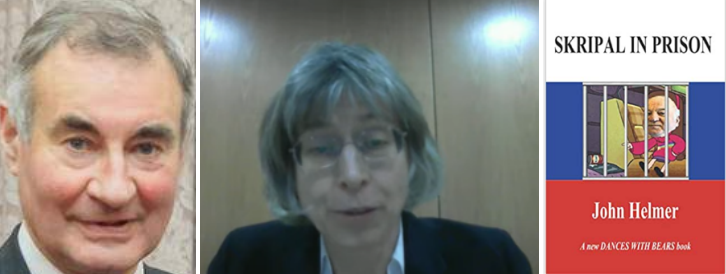
Left to right: Lord Anthony Hughes; Catheryn McGahey KC; the book on the Skripal case – click to read.
In an edited record of the last closed-door session of Hughes’s proceeding, it was revealed that the police evidence report, as well as testimony by ambulance, hospital, and other witnesses are likely to be kept secret when the inquiry becomes a public hearing. The start of that is unlikely to be before mid-2024, officials said last week.
When BBC, the state propaganda platform, reported the secrecy and the delays, it claimed in the government’s defence that there have been “sensitivities” in more than a thousand pieces of documentary evidence compiled by the police so far. The BBC omitted to report that the electronic veto has been introduced.
The BBC also repeated the certainty that Novichok was intended by the Russians for “the original targets of what police believe was a Russian hit squad in Salisbury.”
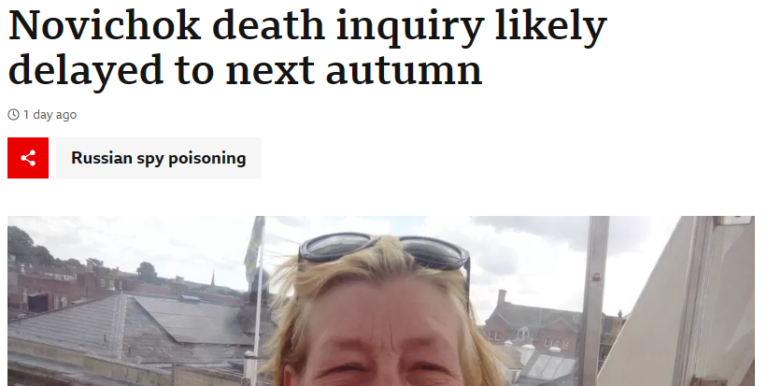
Source:
https://www.bbc.com/
A leading London reporter reacted at the fresh attempts to conceal evidence. “For an inquiry that wasn’t going to happen, into the supposedly straightforward death of someone in hospital supposedly from poisoned perfume, there is an enormous amount of secrecy/closed hearings attending this. You have to ask how much of this inquiry/inquest is actually going to be heard in the open. Now that we’re into ‘categories of sensitivity’ any normal person listening to this inquiry would be in despair.”
The judge made an oblique reference to the war in the Ukraine, claiming the British experts on Russia who are needed for the Novichok side of the Sturgess case have their work cut out for them fighting the Russians. “[HUGHES] What is clearly right is that there is a limited number of specialists in the particular field of the asserted hostile state. [MANSFIELD] Yes. [HUGHES] And in that field, just at the moment, there are a large number of rather pressing calls on their time.”
Mansfield also revealed publicly for the first time that he and the Sturgess family want the release of closed-circuit television (CCTV) tapes of the Skripal home, the centre of Salisbury on the day of the Skripal incident, and other locations. These tapes, including private premises security recordings, were all confiscated by the police immediately after the Skripal incident; they have been withheld since then.
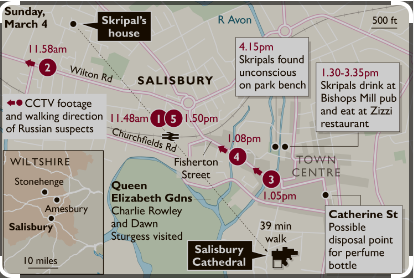
Source:
https://www.thetimes.co.uk/
Mansfield is aiming at evidence that British security agents were following the Skripals and also the alleged Russian assassins; or proof that if they were not, they ought to have been. From this evidence Mansfield is making his case for a multi-million pound payout for the Sturgess family in compensation for what he alleges has been the government’s negligence.
According to Mansfield last Friday, “this involves — again I am not stating a state secret here, there is an allegation in a film that’s been made about all of this that when they [alleged Russian assassins] arrived at Gatwick [Airport] they were followed and Skripal himself was followed. Now whether that’s true I don’t know. CCTV would be relevant to all of that.”
Mansfield also asked for open disclosure of the scientific evidence on the organophosphorus compound called the Novichok nerve agent, which the British Government has told parliament was used against the Skripals and then against Sturgess, killing her. “MR MANSFIELD: It’s that kind of material. Then again I am looking at the list that we have out of the scope [of inquiry] issues, the Novichok itself is of interest or may be of interest. Well, it’s the central agent here. The question is the link between the Novichok and where it was found in Salisbury in terms of where it was distributed, not the bottle, but where was it found on a door handle, on a car handle and so on, these are all matters of the distribution and it ties into is it — how does it compare with the bottle and the Novichok?”
The lawyer for the Sturgess family is saying that almost five years after Sturgess’s death, the family has been told what happened but they have been shown no evidence and allowed to ask no forensic questions. They have been told to trust the government. Hughes warned them against expecting more, dismissing their lawyer’s skepticism.
“[MR MANSFIELD] There is scientific evidence as we understand it, but we have not seen it. So may I just put it – [HUGHES] The identity of the material? MR MANSFIELD: Yes, scientific evidence, which we can’t imagine is subject to any kind of restriction order.”
“[HUGHES] I wouldn’t be too sure about that, Mr Mansfield.”
“MR MANSFIELD: In view of what was said publicly by various politicians, unless they have it wrong, which is possible.”
“[HUGHES] But the extent of the defensive knowledge, defensive corporate knowledge of potential dangerous agencies is highly sensitive potentially, isn’t it?”
Hughes’s response indicates the likelihood that the central evidence of Novichok, which has been the core of the case against Russia, will be kept secret. Click to read Hughes’s secrecy order, dated March 14.
Hughes will decide shortly whether to convene another open preliminary session next July or September. Thereafter, he and the lawyers assisting him believe the first formal opening session of the inquiry will not occur before October 2024.
https://johnhelmer.net/the-british-gove ... more-87725
'When ya ain't got nothin', obfuscate'



